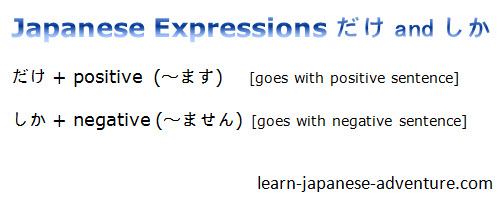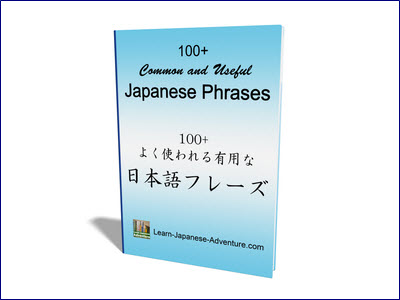- Home
- Intermediate Lessons
- Japanese Expressions dake shika
Japanese Expressions
だけ dake and しか shika -
Intermediate Lessons: 8
In this lesson, you will get to learn the Japanese expressions that indicate "only", "just" or "merely".
Basically there are two of them - だけ (dake) and しか (shika). While both of them have the meaning of "only", they are not exactly the same.
Differences between だけ (dake) and しか (shika)

Firstly, most of the time だけ (dake) goes with positive sentence whereas しか (shika) always goes with negative sentence.
Secondly, a "~だけ" sentence is used for general description of something or the situation, without any personal feeling involved for the speaker. The meaning is neutral and there is no judgement.
Whereas a "~しか" sentence highlights the objective term and emphasizes the speaker's feeling on the exclusiveness or uniqueness of something or the situation. It's usually used to explain one's inclination towards something.
Usually しか (shika) is used in the situation where the speaker think that the amount is not enough or it's too little, with negative personal feeling involved.
For example, if you say the following sentence...
- ここにケーキが一つだけあります。
koko ni ke-ki ga hitotsu dake arimasu
Meaning: There is only one cake here.
You are merely stating the fact that "there is only one cake here". No judgement, no personal feeling.
However, if you were to say it this way...
- ここにケーキが一つしかありません。
koko ni ke-ki ga hitotsu shika arimasen
Meaning: There isn't anything but one cake here.
Although it still means the same where there is only one cake, you are emphasizing that the amount is not enough.
Maybe your family has 4 members, but you only have one cake. You are feeling that it's definitely not enough to share among your family members.
Therefore, although both Japanese expressions だけ (dake) and しか (shika) have the same meaning of "only", they are used differently depending on the situation.
More Examples
Let's use another example to show the differences between these two Japanese expressions. If you say this...
- あの人は英語だけ分かります。
ano hito wa eigo dake wakarimasu
Meaning: That person only understands English.
You are just stating the fact that "That person only understands English". There is no other personal feeling involved.
But if you say the following sentence instead...
- あの人は英語しか分かりません。
ano hito wa eigo shika wakarimasen
Meaning: That person doesn't understand any language but English.
Besides the meaning of "That person only understands English", you also emphasize your feeling towards that person where understanding English alone is not enough, that person should understand other languages as well.
Let's use one more example. If you were to say this...
- 私は肉だけ食べます。
watashi wa niku dake tabemasu
Meaning: I only eat meat.
In the above sentence, you are merely describing the fact that "you only eat meat".
However if you were to say this...
- 私は肉しか食べません。
watashi wa niku shika tabemasen
Meaning: I don't eat anything but meat.
The above sentence has a stronger nuance of your eating habits, it also emphasizes your feeling that you eat nothing but meat only.
Some Exceptions on the Two Japanese Expressions
By now you should know that there are always exceptions in Japanese.
1. When だけ (dake) is used in a noun sentence (Noun です), it doesn't always go with a positive sentence. Sometimes, it can also go with a negative sentence. For example...
- 私達の先生は日本人だけです。
watashitachi no sensei wa nihonjin dake desu
Meaning: Our teachers are only Japanese.
- 私達の先生は日本人だけではありません。
watashitachi no sensei wa nihonjin dake dewaarimasen
Meaning: Our teacher are not only Japanese.
2. While しか (shika) is often used in the situation that involved speaker's negative feeling, it's not always the case. For example...
- うちから学校まで10分しかかかりません。
uchi kara gakkou made juppun shika kakarimasen
Meaning: It takes only 10 minutes from my house to the school.
In this situation, you are stressing the positive meaning that the school is very near to your house.
Best Deal of the Year! Get 68% OFF Lifetime Premium! Ends on 13 Dec 2025
Click Here to Get 68% OFF Lifetime Premium and be on the fast track to fluency in Japanese.
The link above is an affiliate link, which means that I would earn a commission (at no extra cost to you) if you do end up purchasing the related learning course.
Previous - Lesson 7: かどうか ka dou ka
Buy me a coffee









Facebook Comments
Don’t see the comments box? Log in to your Facebook account, give Facebook consent, then return to this page and refresh it.